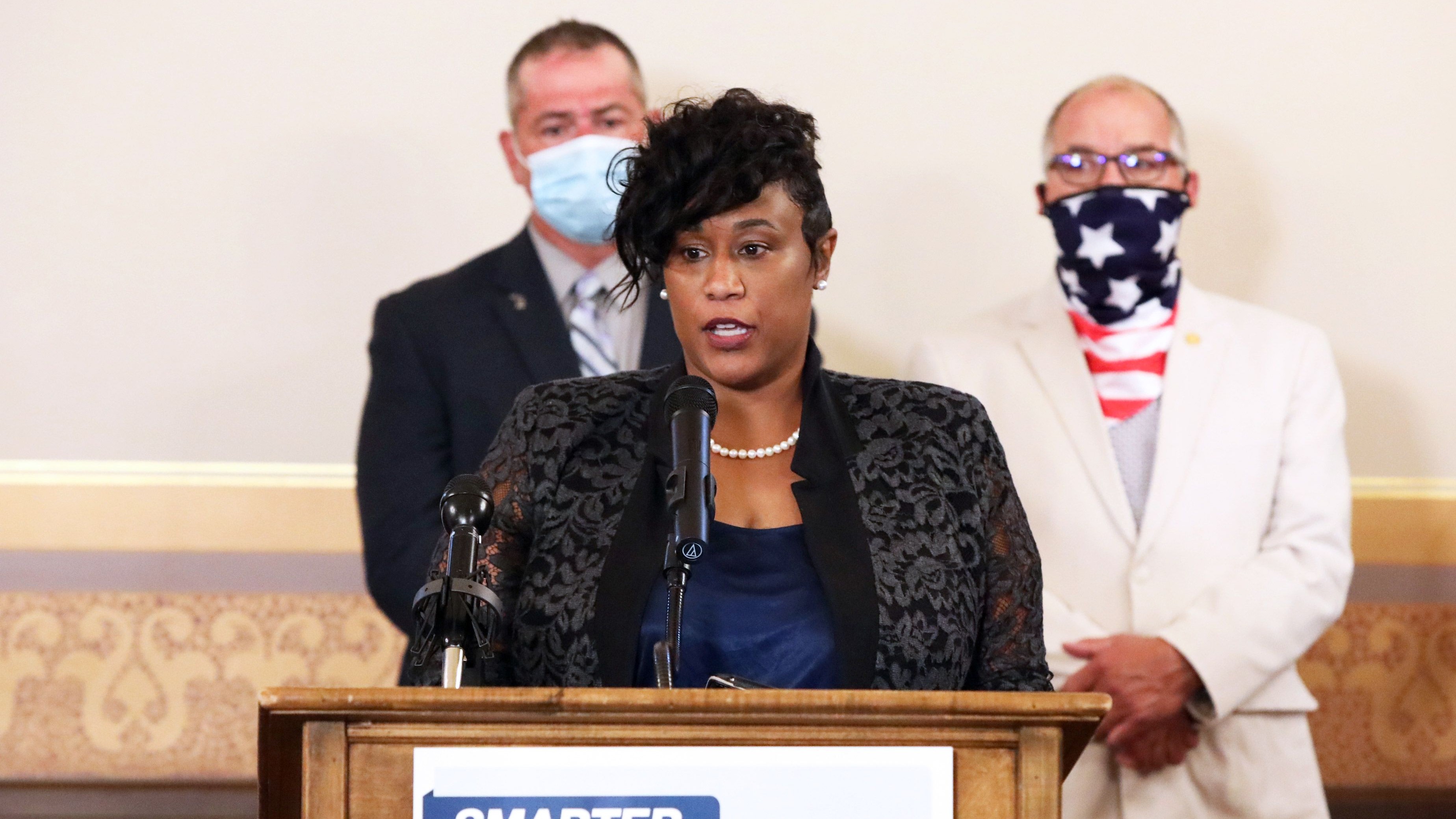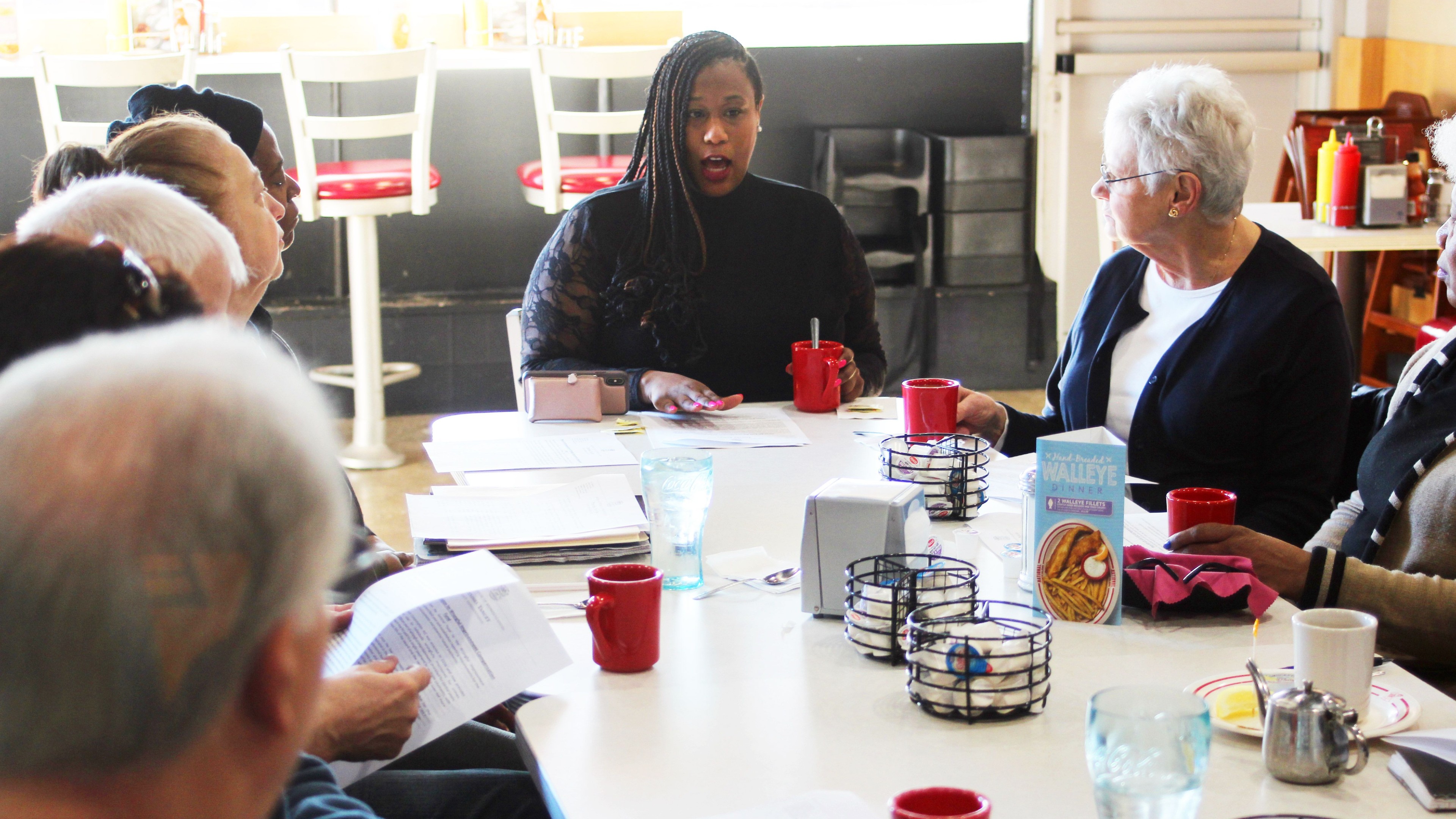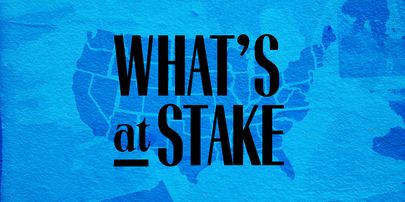Tenisha Yancey Is a Michigan House Rep With a Felony Record—and It's Helping Her Design Legislation
Here's what she thinks about the voting rights controversy in Florida.


People with felony records in Florida have to pay off old court fines before they can vote; in 10 other states, people with records are limited in how and whether they can vote. Michigan House representative Tenisha Yancey is watching these and other after-effects of incarceration with alarm. She has a felony record herself. As a teenager, she was convicted of retail fraud and charged with felonious use of a firearm. Still, Yancey, 44, got her law degree, worked as an assistant prosecutor in Detroit's juvenile division, and, in 2017, became a Michigan House member representing parts of Detroit and its suburbs. While at first she kept quiet about her criminal record, worried that voters and colleagues would judge her negatively for her past, she’s become a vocal supporter of criminal-justice reform. Marie Claire spoke with Yancey about her complicated past, how it informs her work as a legislator, and her views on the justice system. (And, yes, in Michigan, which automatically restores felons’ voting rights upon release, Yancey votes—including, on Tuesday, for herself.)
Marie Claire: You were raised in Detroit, and your parents had these classic Detroit jobs.
Tenisha Yancey: My dad was a Detroit bus driver. My mom worked at General Motors, in Local 22, which was the Poletown plant, as an assembly line worker. After she had a stroke, when I was eight, she was an elevator operator, and that lasted until her second stroke when she was forced to retire [when she was about 39 and I was about 10].
MC: What did her strokes mean, day to day, for you?
TY: By then both my older siblings were out of the home, and my dad didn't live with us. I couldn't go out to play with my friends because I needed to help her read and write, or I had to write out the checks for the bills.
MC: Tell me about your neighborhood growing up, in the 1980s and ‘90s.
TY: We were the first or second black family on the block. That changed over the years because of the great white flight: All the white families moved out, all the black families moved in, and then there was the crack epidemic that went on [to the point that] it became the norm that there was a crack house on every corner. [The dealers] were my friends' siblings; it was never a threatening situation to me. But we were impacted by it. [When I was about 10, and my older brother was over], I remember the D.P.D. [Detroit Police Department] kicked in our front door and we were all really, really scared. I remember my mom saying, 'Go upstairs, go upstairs'—she still could say certain words [after her stroke]. Come to find out, the police had the wrong address.
Stay In The Know
Get exclusive access to fashion and beauty trends, hot-off-the-press celebrity news, and more.
MC: What led to the spate of criminal charges in your teenage years?
TY: Being a product of my environment, one, and two, having already gone through the traumatic experience of my mom's strokes and essentially losing a parent, and then my dad's death, five days before my 14th birthday. As he was getting luggage out of the car, a drunk driver came and smashed him. After that, I went down a very, very dark, downward spiral. [I was] not caring, not giving a damn about anything.
Then I turned 17 and graduated from high school, and there was an incident that occurred in June of that year. There was a girl who I had an altercation with about our mutual boyfriend (unbeknownst to me). She had initially come to my job to confront me, [and later I brought] a firearm into [her] occupancy. Then there was returning items: I would pick up an item at a store and walk up to the counter and say, 'I'd like to return them,' and they'd give me a gift card or put it on a credit card. I knew that it was wrong.
In Wayne County jail—I was there for two weeks—it was horrible living conditions, leeches in the shower. [Then] I did 90 days in [jail] in Kalamazoo County. I would look at the women who'd been in and out of this jail their entire lives, and I'm like, How did you get here? And how do I make sure that I do not return? I was 18 when I got out. After I got food from my mom's house, the very next thing [I did] was to enroll in [college].

MC: How did you decide on law school?
TY: I always wanted to be a lawyer, and I definitely felt intimidated by law school after the felony. People were very discouraging: 'You're not gonna pass character and fitness' [a portion of the bar exam]. I called a judge, a friend of my family, and he said, even if you don't pass the bar, a J.D. behind your name will take you a lot further in life. I went to law school [at night] down the street from where I worked [as a paralegal], so I knew I could make it to school even if I had to walk.
MC: You had a young son at the time, too—you must've been exhausted.
TY: Exhausted. My son came right at the end of my two-year degree, right before I started a four-year degree. My sister, we jokingly called her my baby daddy, because [my son] was always there at her house. There were times that I wanted to drop out of law school. I remember getting a 2.4 the first semester and I cried; I'm a person who had 3.5 GPAs my entire life. Then I talked to a lawyer that I worked with. He said, 'Do you know what they call a lawyer with a 2.4 GPA?' I'm like, 'No, what?' And he was like, 'A lawyer. So you're gonna get your ass back to class today.'
Character and fitness [examines]: Are you absolutely sound and fit to practice law? [The bar examiners] sent me a letter and said, ‘We see you have this criminal background. Why should we allow you to pass?’ Initially I started giving them my life story about what I did, why I did it. I've had some great mentors, and my executive director at the time said, ‘Delete all this shit and answer the question.’ And that's what I did; I deleted my whole life story that I had typed for three days.
In between this character and fitness portion, you're also studying to take the actual bar exam, the written portion. Before I got my results back from the written portion, I got a letter [saying I passed character and fitness]. It was a huge relief. Then, I got the results for the bar, and I had failed by three points. At first I'm like, I'm not going to do this again. Then it dawned on me. I've already passed the part that I can't control. This is the part that I can control. I'm going back for three points.
MC: Why did you want to become a prosecutor?
TY: I liked criminal law, and once I got in the juvenile division, I [wanted] to share my testimony with some of the offenders. After the case had been adjudicated, I'd ask defense counsel for permission to speak with the client. And I would share my story.
If you can understand that I changed my life afterwards, and you can accept me, you should be able to accept legislation that gives people additional chances.
MC: When you entered the House race in 2017, were you worried about your criminal record? The race got fairly ugly, quickly.
TY: I knew it would come up. It hurt. I don't think I've ever felt ashamed of [my record] because it was something that I clearly had to go through in order to get me to where I am now. It was just the fact that people wanted to bring it up as if it had happened yesterday. [Campaigning] in Grosse Pointe [a rich suburb], I was perceived in a negative light, but in Detroit, they felt I was being railroaded. I had one guy say, 'I know you; you’re the girl who got in a fight when you were two years old and they just want to send you to hell for it.' Surprisingly, I heard [from people] who felt confident to share things with me: Some people would tell me, 'I was a child when I was convicted.' Some had DUIs and they're like, 'I understand. Once you do it you can't go back.'
MC: What was it like the first time you went to Lansing as a legislator?
TY: That was kind of surreal, to look out the window and see the capital. The job [I have] to do is not overwhelming; the time constraint is. I have ideas at four o'clock in the morning sometimes, and I respect my staff enough to not text their phones. I put it in Slack: Let's research this and see if we can get legislation here. What I don't like is that you can have the greatest ideas and it won't go anywhere because of party lines.
MC: You've supported legislation around criminal justice, including expunging certain kinds of criminal records, increasing police accountability, and adding penalties for people who call in false police reports. Does having a criminal background yourself give you a different perspective?
TY: Yeah. I'm working on a project that we will take into the schools, hopefully. I want to teach young people what a crime is, elements of crimes. Because how do you hold someone accountable for certain things if they're not even aware that it's a crime? So [my] accessory [retail-fraud conviction], for instance: I thought if I'm not doing the actual act [of exchanging items for money], why would I be in trouble? I want to make sure that they are aware of the consequences.
MC: Last year, when an expungement bill was under consideration, you spoke about your own record on the House floor in a moving way. Was that a big deal?
TY: Oh, yes. Some of my colleagues feel... I've heard dialogue on how people view people who have committed crimes. They don't necessarily deem these people as being worthy at all. My colleagues have something to gain from knowing that this was once me, but it should not be the end-all be-all for me or for anyone else. It's really funny, sometimes, to see their faces when they find out that I have a criminal background; they're just completely blown away. And if you can understand that I changed my life afterwards, and you can accept me, you should be able to accept legislation that gives people additional chances.
MC: When you see collateral consequences of convictions play out, especially right now, where felons in some states are barred from voting, what's your reaction?
TY: It’s absolutely insane. Your right to vote should be based on the fact that you are a tax-paying citizen; you should not base it on past behaviors. Like for me, am I going to be punished for the rest of my life for what I did as a teenager? You're disenfranchising a group of people, and it can be a form of racism. Something else I'm working on—this does reflect my experience as a convicted felon—I'm not able to sit on a jury. I have a bill [to change] that. Why wouldn't you want someone like me on your jury? I can be impartial; I can probably be more impartial than someone who's never had contact with the criminal justice system.
Related Stories


Stephanie Clifford is an award-winning journalist writing about criminal justice and business, and author of the bestselling novel Everybody Rise.
-
 Tyla's Coachella Outfit Pairs Dolce & Gabbana With Pandora
Tyla's Coachella Outfit Pairs Dolce & Gabbana With PandoraThe singer wore a gold version of the crystal bra made famous by Aaliyah.
By Amy Mackelden Published
-
 How Kate Middleton Is Influencing George's Fashion Choices
How Kate Middleton Is Influencing George's Fashion ChoicesThe future king's smart blazer is straight out of Princess Kate's style playbook.
By Amy Mackelden Published
-
 King Charles "Couldn't" Meet Prince Harry During U.K. Visit
King Charles "Couldn't" Meet Prince Harry During U.K. Visit"It could actually bring down a court case."
By Amy Mackelden Published
-
 36 Ways Women Still Aren't Equal to Men
36 Ways Women Still Aren't Equal to MenFeatures It's just one of the many ways women still aren't equal to men.
By Brooke Knappenberger Last updated
-
 How New York's First Female Governor Plans to Fight for Women If Reelected
How New York's First Female Governor Plans to Fight for Women If ReelectedKathy Hochul twice came to power because men resigned amid sexual harassment scandals. Here, how she's leading differently.
By Emily Tisch Sussman Last updated
-
 Why the 2022 Midterm Elections Are So Critical
Why the 2022 Midterm Elections Are So CriticalAs we blaze through a highly charged midterm election season, Swing Left Executive Director Yasmin Radjy highlights rising stars who are fighting for women’s rights.
By Tanya Benedicto Klich Published
-
 Tammy Duckworth: 'I’m Mad as Hell' About the Lack of Federal Action on Gun Safety
Tammy Duckworth: 'I’m Mad as Hell' About the Lack of Federal Action on Gun SafetyThe Illinois Senator won't let the memory of the Highland Park shooting just fade away.
By Sen. Tammy Duckworth Published
-
 Roe Is Gone. We Have to Keep Fighting.
Roe Is Gone. We Have to Keep Fighting.How To Democracy always offers a path forward even when we feel thrust into the past.
By Beth Silvers and Sarah Stewart Holland, hosts of Pantsuit Politics Podcast Published
-
 The Supreme Court's Mississippi Abortion Rights Case: What to Know
The Supreme Court's Mississippi Abortion Rights Case: What to KnowThe case could threaten Roe v. Wade.
By Megan DiTrolio Published
-
 Sex Trafficking Victims Are Being Punished. A New Law Could Change That.
Sex Trafficking Victims Are Being Punished. A New Law Could Change That.Victims of sexual abuse are quietly criminalized. Sara's Law protects kids that fight back.
By Dr. Devin J. Buckley and Erin Regan Published
-
 My Family and I Live in Navajo Nation. We Don't Have Access to Clean Running Water
My Family and I Live in Navajo Nation. We Don't Have Access to Clean Running Water"They say that the United States is one of the wealthiest countries in the world. Why are citizens still living with no access to clean water?"
By Amanda L. As Told To Rachel Epstein Published